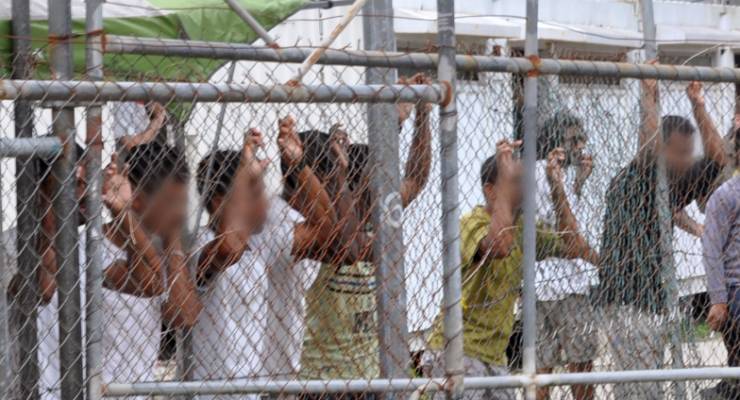
Germany is one of the few nations in the world to allow the prosecution of serious human rights abuses even where the accuser and the accused have no connection with Germany, a process called universal jurisdiction. Lawyers from the European Centre for Constitutional and Human Rights in Berlin are currently seeking to bring to justice members of the Assad regime who are alleged to have tortured Syrians.
Given the lack of interest that the International Criminal Court has shown in investigating possible crimes against humanity committed by members of the Abbott and Turnbull governments in respect to asylum seekers detained on Nauru and Manus Island, does the German legal system provide an alternative way forward to hold ministers such as Scott Morrison and Peter Dutton to account?
Over the past five years the ICC has received requests from Independent MP Andrew Wiklie and a number of lawyers to open an investigation into the serial human rights abuses perpetrated at the centres on Nauru and Manus Island. The allegations against ministers in Coalition cabinets are that they have, through mandatory detention of asylum seekers and deportation of unsuccessful claimants, violated international law which prohibits severe deprivation of physical liberty, deportation and other forcible transfer of population; and other international acts causing great suffering, or serious injury to mental and physical health.
In February last year, a submission from the Global Legal Action Network (GLAN) and the Stanford International Human Rights Clinic was submitted to the ICC asking it open an investigation into possible “crimes against humanity committed by individuals and corporate actors”. The submission noted that the “privatised facilities [on Nauru and Manus Island] entail long-term detention in inhumane conditions, often including physical and sexual abuse of adults and children”.
The ICC has not responded to the various submissions made by Mr Wilkie and other groups and individuals. Perhaps it is time to explore the German option.
Introduced in 2002, Germany’s Code of Crimes Against International Law, known as the Völkerstrafgesetzbuch, states that it “shall apply to all criminal offences against international law designated under this Act, to serious criminal offences designated therein even when the offence was committed abroad and bears no relation to Germany.”
As Yuna Han of the European University Institute has noted, the code has been previously enforced in an arrest warrant for “against an individual who was identified as an ISIS leader for crimes of genocide … committed in 2014”. The German federal prosecutor’s office has also “launched ‘structural investigations’ to gather evidence on the Syrian conflict generally, rather than on crimes committed by specific suspects, paving the way for future prosecutions”.
Han argues that given Germany is “such efforts by the German judiciary to prosecute international crimes are significant”.
So what would need to be done for German federal prosecutors to seek an arrest warrant for ministers Dutton and Morrison and other officials intimately involved in the execution and operation of Manus and Nauru?
Fortunately, there are mountains of documentary evidence from asylum seekers, medical professionals and other workers who have been present at the camps. The UN and Human Rights Watch have released detailed reports and the GLA/Stanford submission contains details from eye witnesses. There is also no doubt that responsible ministers and their departmental officials have known about the inhumanity of these centres. As Rebecca Hamilton, assistant professor of law at American University, Washington College of Law, notes, “Australian government officials, to the extent that they are aware of what is happening and are continuing to authorize it, they’re absolutely on the hook,”.
Armed with this information, German prosecutors could compile witness statements and reply on sources documents such as files published by The Guardian in 2016 that detailed the extent of children self harming and the chronic levels of sexual abuse of women on Nauru. A case for Manus Island could include documentary evidence and witness statements from the now settled Victorian Supreme Court action which resulted in a pay out close to $100 million in damages and costs last year.
The next step would be to have the German Attorney-General issue arrest warrants and seek the extradition of those subject to the warrant, though the Turnbull government would resist those attempts.
Perhaps most likely, however, the German authorities can go to the ICC and indicate they will not pursue the case if the ICC actually decides to do what many are legitimately asking it to do – investigate Australian government ministers and officials for crimes against humanity.
Greg Barns is a barrister and Spokesman for the Australian Lawyers Alliance. He has advised Andrew Wilkie MP on Mr Wilkie’s 2014 submission to the ICC on Australian government crimes against humanity on Nauru and Manus Island.








“Universal jurisdiction” would be useful for prosecuting carbon emitters in recalcitrant countries. Perhaps a lawyer reader could point to a law for the purpose.
I personally would love to see dutton and co. dragged to court on a crimes against humanity charge, and abbott and turnbull as well , maybe hang the bastards like the did eichmann.
Perhaps a job for The Hague? If it is too involved in chasing down the losers in 3rd World civil wars then it would only have to wait a short while for this lot to meet that criterion.
Also, the General Assembly of the UN, while not court, is nonetheless a forum for the airing of putrid government actions.
That would be like trying to prosecute Israel for religious discrimination (or any other human rights abuse). I’d love to see the scum brought to book, but Rudd must be there too.
What a wonderful dream come true that would be 🙂